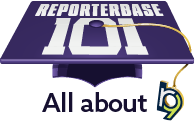Lesson #36
Billing – Export Invoices function
If you have clients that require LEDES-compliant electronic billing, first set up your RB9 LEDES preferences for service items and invoices. Then enter your clients’ codes, such as their Client Matter No. and Client ID, on the case party, job party, or invoice level. When you generate invoices for the related jobs, they will have the proper UTBMS codes, and you can export them in LEDES 98B format, which is the most commonly used LEDES format, and email the text file to the client.
After posting invoices, search for a particular firm’s invoices in Export Invoices for a specific date range. You can also search for their invoices by post date instead of invoice date; and restrict your search results further by filtering for a single case and/or your company’s business units.
Invoices in the results gird display their information in all of the search categories plus invoice number and amount, Bill To contacts and Sold To clients, job number, and job date. You can sort your results in the grid by one or more columns in ascending or descending order (but when you exit the function, RB will revert back to the default order). Export the list as an Excel spreadsheet or a CSV (comma-separated values) file to save, print, share, or use in other applications.
You can view any individual invoice’s details, edit some of its information, upload/download/email/manage its repository files, and make notes in its Notes Log.
Export any or all invoices listed in Export Invoices results in LEDES 1998B format to your device as a .txt file, which you can then validate and email to your client from your device.
NOTE: This is an RB9-only function. It is not included in RB Lite.
TL;DR: Export invoices in LEDES 98B format for clients who require electronic billing that complies with LEDES standards.
RB concepts in this lesson
Bill To Contact/Firm: The contact/firm responsible for paying the invoice for a job.
Business Unit (BU): One of your company’s revenue centers or any entity in your business that you want to track separately.
Job: Usually the reporting of a deposition, but can also be any kind of service you provide with your reporters or other resources, such as realtime, videoconferencing, or read & sign. More >
Notes Logs: Un-editable internal-use only notes entered either by a user or automatically by RB appear in chronological logs in the database record where they occurred, such as a case, job, invoice, or entity.
Sold To Contact/Firm: Contact/Firm that ordered the services on the invoice.

